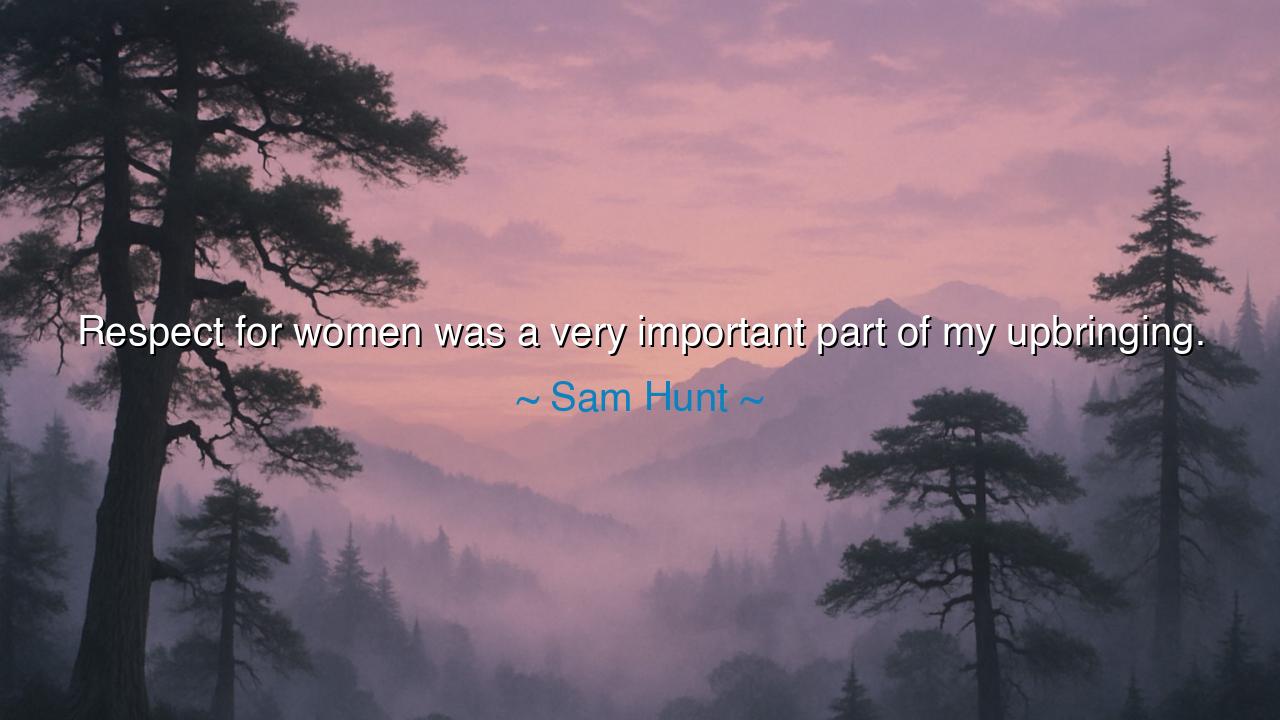
Respect for women was a very important part of my upbringing.






"Respect for women was a very important part of my upbringing." — Sam Hunt
Hear now the gentle yet powerful truth spoken by Sam Hunt, a man who, though known for melody, here sings a hymn of values. When he declares, “Respect for women was a very important part of my upbringing,” he reveals not just a lesson of the home, but a foundation of the soul. For respect, especially toward women — the givers of life, the nurturers of generations — is not merely courtesy, but reverence for creation itself. In his words lies the echo of every ancient teaching that reminds us: a civilization’s worth is measured not by its wealth or power, but by the honor it bestows upon its women.
To speak of upbringing is to speak of roots — the deep soil of character from which every action grows. Hunt’s statement points to a truth too often forgotten: that respect is taught, not assumed. It begins not in law or politics, but in the sacred spaces of childhood — in how a boy watches his father treat his mother, how a child listens when her elders speak, how the home itself becomes a small temple of dignity. When respect is sown early, it blooms lifelong. But when neglected, it leaves barren fields — and from such neglect arise the injustices and cruelties that plague the modern age.
In the old days, the wise honored the feminine principle as divine. The Egyptians bowed before Isis, mother of healing; the Greeks honored Demeter, goddess of the harvest; in the East, men and women alike knelt before Shakti, the creative power of the universe. To revere women was to acknowledge the sacred rhythm of birth, nurture, and wisdom that sustains all life. But when that reverence faded, empires fell into decay. For without respect, strength becomes tyranny, and freedom becomes chaos. Thus, when Sam Hunt speaks of respect as part of his upbringing, he speaks of an ancient order — one that must be remembered if humanity is to remain whole.
Consider, for a moment, the story of Abraham Lincoln, who, though a giant of history, never forgot the gentle hand that shaped him. It was his mother, Nancy Hanks Lincoln, who taught him to read, to pray, to feel compassion. When she died, he said, “All that I am or hope to be, I owe to my angel mother.” Her influence was not through power or command, but through quiet dignity and love — the same qualities that demand respect, not by force, but by virtue. Her example shows that when men respect the women who guide them, they rise to heights otherwise unreachable.
Respect for women is not merely a personal virtue — it is the cornerstone of justice and peace. When women are diminished, families weaken; when they are uplifted, nations flourish. The wise understand that every woman carries within her the potential for both creation and counsel. To disregard her voice is to silence half the wisdom of the world. Hunt’s upbringing, then, was more than cultural — it was moral, even spiritual. It taught him that strength and gentleness are not enemies, but allies, and that manhood is defined not by dominance, but by honor.
In the modern world, where haste and pride often drown out humility, this teaching must be rekindled. Let every home, every classroom, every community remember: respect begins in the heart, but must live in action. To listen without interrupting, to protect without patronizing, to appreciate without objectifying — these are the quiet acts that rebuild dignity in our world. For respect is not shown in grand gestures, but in the small choices that shape daily life.
So, O children of the future, take this teaching into your souls: let respect for women be not a slogan, but a way of being. Speak with gentleness, act with fairness, and let your deeds reflect gratitude for those who give life, wisdom, and grace. If you are a parent, teach your sons to honor women as equals; teach your daughters to expect nothing less. If you are a leader, make justice for women the measure of your worth. For in the words of Sam Hunt, we find a timeless truth: respect for women is not a lesson of culture — it is the essence of civilization.
And thus, remember always — to respect women is to respect life itself. For every mother, every sister, every teacher, every daughter is a reflection of the eternal feminine, the heartbeat of humanity. To honor them is to honor the divine order. Let this be your creed: respect is strength, and reverence is the highest form of love.






AAdministratorAdministrator
Welcome, honored guests. Please leave a comment, we will respond soon